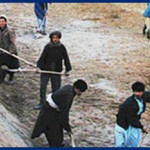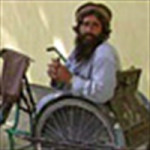
Never before in the country’s history has the central government been be able to communicate directly with all of the provinces, nor the provinces with each other. This lack of communication made it difficult to govern effectively.

"If the tunnel is open and the road is good, my income will go higher and the whole world will be happy. Then I will have no headache."

Most of the fields in the Fatmasti Valley of Bamyan Province were not cultivated for years after war and drought forced most of the people in the valley to flee to Iran. Since agriculture is a way of life for 70 percent of Afghanistan's people, building the canal and other infrastructure is key to re-establishing this crucial source of income.

For women in Afghanistan, the Taliban years were a time of deprivation and second-class status. Most of them were banned from working outside the home. This was particularly hard on widows. There are an estimated 50,000 war widows in Kabul alone who need to work to support their children. Under the Taliban, the widows’ bakeries were usually permitted to operate. Still, there were arbitrary arrests and beatings of women working at them, and bakeries were shut down at whim.

After years of war in Afghanistan, there are an estimated one million handicapped people who are in need of assistance ranging from prosthetic devices to training. With a new, more democratically-oriented government in place, disabled Afghans across the country have been demanding acknowledgement of and support for their basic needs. After a recent demonstration in Kabul, the Afghan government agreed to raise a monthly stipend for disabled people from $2 to $5.








Comment
Make a general inquiry or suggest an improvement.